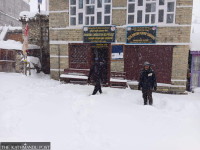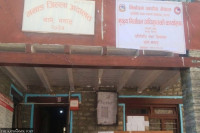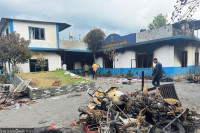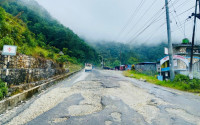Gandaki Province
Water shortage getting chronic in Baglung settlements
Crisis has deepened as springs have depleted due to prolonged drought and wildfires. Women are especially affected, working women the hardest hit.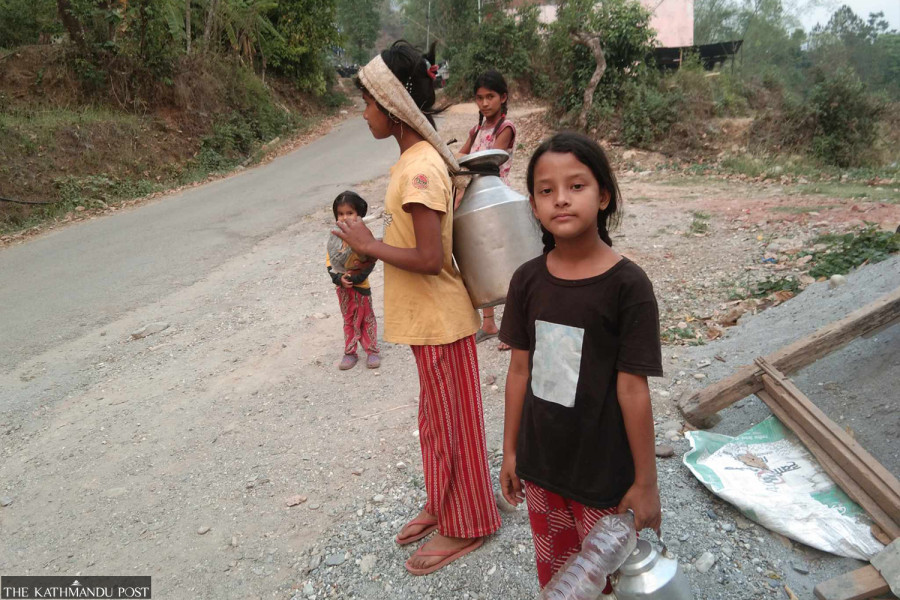
Prakash Baral
Every morning, Sonam Nepali, an eighth grader at a local school in ward 1 of Jaimini Municipality, starts her day by fetching a gagri (water pot) of water from the nearby spring before heading for school. Sonam’s friend Sonu Nepali, aged 12, also has a similar routine. They spend the whole morning bringing water home to help their parents. They go either to Jumlikhola, Timurkhola or Tatopani to get the water.
“We have to help our mothers fetch drinking water daily during the dry season. Most of the time, we can’t complete our homework because we spend the entire morning fetching water,” said Sonam, describing Sonu’s difficulties as well.
The locals of Tar settlement face a severe shortage of drinking water every year. The situation has further worsened this year due to a long drought and unchecked forest fires in the area.
“Most of the springs in the village have dried up. The massive fires in the local forests have made the situation in the village even worse,” said Krishna Maya Thapa, a local. According to her, it has not rained in the area since October, causing drinking water scarcity.
Women are especially affected by the drinking water crisis, with working women being the hardest hit as they have to fetch water, do the household chores, and go to the office. “The water taps in the village have run dry. It takes a lot of time to fetch water from far away. It is quite difficult for me to complete the household chores and go to school,” said Yamuna Sharma, a teacher at a local school.
Drinking water crisis in Tar has been going on for years. About a decade ago, a “one house, one tap” campaign was launched in the village. Pipelines were installed and taps were built. But the taps ran dry as the drinking water project was affected by a land dispute.

The government started a drinking water project with a plan to supply water in Tar from Rayadanda in ward 11 of Baglung Municipality. “But some landowners along the project route prevented us from building the intake tank for the water supply. We tried to resolve the dispute through negotiations but were unsuccessful,” said Bishnu Prasad Acharya, the chairman of ward 1 of Baglung Municipality. “We installed 90 mm pipes and built taps as well. But the water project could not be completed,” he added.
A total of 45 households in Tar and as many households in Samrumta are dependent on water from the nearby Chhahara stream. They are facing problems as the water in the stream has depleted markedly due to a long dry spell.
Kushmisera Bazar is also reeling under a severe shortage of drinking water. People have been using water from the local streams which is not safe for drinking. “We have urged the local residents to boil the water before drinking. Several settlements in the ward are suffering from a crisis of drinking water as the main drinking water project has been left in limbo,” said Acharya.
The Rayadanda drinking water project was started in the fiscal year of 2014-15. A total of 260 taps were built in Tar, Kushmisera and Samrumta settlements in ward 1 of Jaimini. But the project was left incomplete due to a dispute among the locals in the Rayadanda area.
“Around 85 percent work of the drinking water project has been completed. But we could not complete the project and supply water due to opposition from the residents of Rayadanda,” said Kiran Paudel, chief at the Drinking Water and Sanitation Division Office in Baglung.
According to him, the division office is currently planning to launch a lift drinking water project to address the drinking water crisis in Tar, Kushmisera and Samrumta settlements.
“Several water sources have dried up. The villagers are dependent on limited sources of water resulting in a quarrel among them. We don’t know when the drinking water crisis will be resolved in the village,” said Bhimsen Thapa Magar of Tar.




 10.12°C Kathmandu
10.12°C Kathmandu.jpg)
